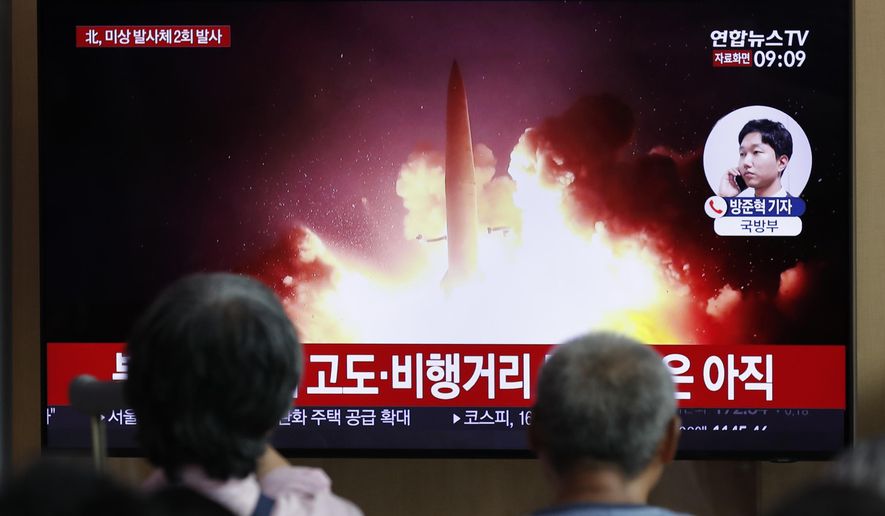North Korea launched more projectiles into the sea Friday, just days after U.S. National Security Adviser John Bolton warned that Pyongyang’s recent wave of short-range missile tests have violated long-standing U.N. Security Council resolutions banning such tests.
Mr. Bolton made the assertion this week, saying U.S. officials had determined at least one of the North’s recent launches was of a “KN-23” missile likely capable of striking “all of South Korea and parts of Japan.”
While Mr. Bolton said the KN-23 and other launches did not technically violate North Korean leader Kim Jong Un’s 2018 promise to President Trump to halt all nuclear bomb, intermediate- and long-range ballistic missile tests, the national security adviser stressed the recent tests did “violate U.N. Security Council sanctions.”
The comments, which came during an interview with Voice of America Wednesday and were a reiteration of previous assertions by Mr. Bolton, apparently fell on deaf ears in Pyongyang, where the Kim regime sped ahead with fresh tests Friday morning, according to South Korean officials.
South Korea’s Joint Chiefs of Staff said projectiles launched from the North’s eastern coast flew about 143 miles before landing in waters between the Korean Peninsula and Japan. U.S. and South Korean forces were analyzing the launches but didn’t immediately say whether the weapons were ballistic missiles or rocket artillery.
Separately on Friday, the North ramped up its criticism of South Korean President Moon Jae-in for continuing to hold military exercises with the U.S. and over his recent rosy comments on inter-Korean diplomacy.
In a televised speech Thursday, Mr. Moon had said momentum for dialogue remains alive despite the series of “worrying actions taken by North Korea recently.”
A statement by an unidentified North Korean government spokesman Friday asserted that Pyongyang has no current plans to talk with Seoul.
The development mark the latest in tension that has surrounded annual U.S.-South Korea military drills being held this month — drills the North says are a rehearsal for invasion.
It remains to be seen whether the Trump administration’s push for renewed nuclear talks with North Korea will gain traction any time soon. The talks have been essentially stalled since February when the two sides abruptly ended a major summit in Hanoi, Vietnam, with no far-reaching deal to end Pyongyang’s nuclear and missile programs.
Mr. Trump said at the time that he had to walk away because Mr. Kim was demanding sweeping sanctions relief for only a limited commitment to destroy part of his arsenal, a characterization the North Korean’s later disputed.
There were signs of diplomatic momentum in early July, when Mr. Trump and Mr. Kim held a surprise hand-shake meeting at a peace village along the Demilitarized Zone dividing North and South Korea. But the talks have yet to restart in any public fashion during the weeks since.
Mr. Kim’s promise not to conduct nuclear bomb or ballistic missile tests, meanwhile, came during the first Trump-Kim summit, which was held in Singapore in June 2018.
• This article is based in part on wire service reports.
• Guy Taylor can be reached at gtaylor@washingtontimes.com.




Please read our comment policy before commenting.